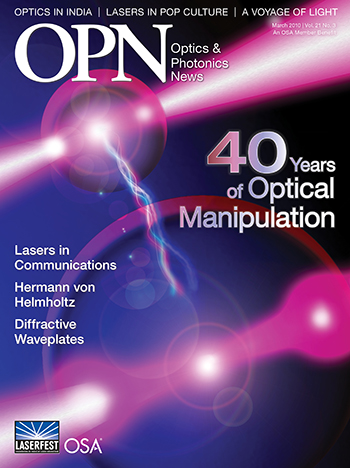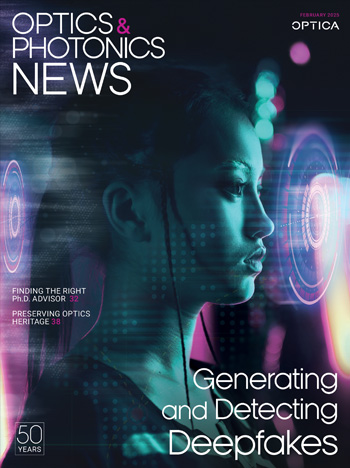
March 2010 Issue
Feature Articles
Forty Years of Optical Manipulation
This year, as the laser celebrates its 50th anniversary, a field that was made possible through laser technology reaches an important milestone as well. Over the past 40 years, optical manipulation research has deepened our understanding of physics and biology, and it has yielded the optical-tweezer technique that is used across all the sciences.
by David McGloin and Jonathan P. ReidLasers in Communications
Low-cost semiconductor lasers power the shortest networks in the data center and the long-haul links that speed information around the globe. Today, lasers are integrated into photonic circuitry and even optical cables.
by Patricia DaukantasHermann von Helmholtz: A 19th Century Renaissance Man
Hermann von Helmholtz was many things to many people: physicist, teacher, medical doctor, aesthete and more. He drew on his extensive knowledge of many fields to invent the ophthalmoscope—a device that revolutionized ophthalmology—when he was just 29 years old.
by Barry R. MastersThe Promise of Diffractive Waveplates
Diffractive waveplates exhibit the high diffraction efficiency of Bragg gratings in micron-thick material layers.
by Nelson V. Tabiryan, Sarik R. Nersisyan, Diane M. Steeves and Brian R. KimballDepartments and Columns
Chilean Children Take a Voyage of Light
In 2008, an optics professor at the University of Chile and ten pedagogy students began work on a program to educate elementary school children about light and optics. A marvelous voyage had begun.
Optics in India
From antiquity to C.V. Raman’s time to today, India has evolved to become a leader in optical research and industry.
A Popular History of the Laser
Long before Ted Maiman made the first ruby laser work, the concept of directed light had already entered the public consciousness—through all manner of sci-fi ray guns, “blasters,” and hand-held beams.
Flat Lens Zooms Fast
An adaptive liquid crystal (LC) diffractive lens developed at the University of Arizona (U.S.A.) focuses with high efficiency and zooms with millisecond-fast switching times.
OPN Talks with Philippe Keryer
Our conversation with Philippe Keryer, executive VP at Alcatel-Lucent and OFC/NFOEC plenary speaker.
Brace, Skinner and Tuckerman: Optics in the Heartland
In the late 1800s, the University of Nebraska became the first school west of the Mississippi to award a doctoral degree. It also gave optics three bright stars and early leaders.
OPN Talks with Hideo Myahara
Our conversation with Hideo Myahara, president, National Institute of Information & Communications Technology and OFC/NFOEC plenary session keynote.
Filming Freezing Flies
To investigate why some insects can survive freezing, while others can’t, researchers filmed the formation and spread of ice in real time as fly larvae froze using high-energy X-rays from the Advanced Photon Source (APS).
Did You Know?
Using standard CMOS tools to fabricate a tiny map of the world.

![Illustration of a synapse in the brain. [Getty Images]](https://opnmedia.blob.core.windows.net/$web/opn/media/images/articles/2025/0425/departments/202504-cover-web.jpg?ext=.jpg)
![Fiber draped around a hand, demonstrating its flexibility. [Photo by Z. Wang and L. Wei]](https://opnmedia.blob.core.windows.net/$web/opn/media/images/articles/2025/0325/departments/202503-cover-web.jpg?ext=.jpg)
